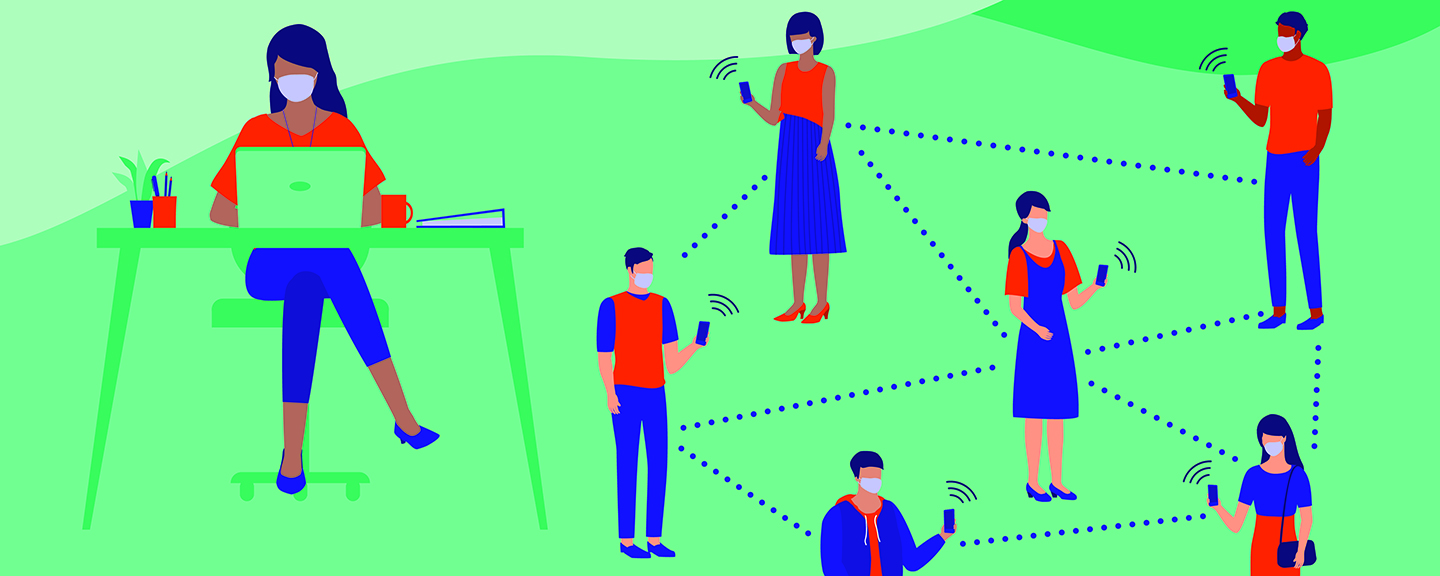- Home
- >
- APU Articles
- >
- News Article
Contact Tracers: Why Nurses and Social Workers Are Equipped for the Job
July 23, 2020 | Written By Heather Nelson

Health departments around the country are facing an unprecedented situation with the outbreak of the novel coronavirus. People who have contracted the illness need to be identified and interviewed so public health officials know both where they contracted the virus and who else they may have exposed.
Contact tracers are the people doing this work—identifying and interviewing infected individuals to stop the spread of the virus. And, according to experts in the fields of public health, those with backgrounds in nursing and social work are perfect candidates for the job. Here’s why these individuals are so well suited for this work and what to consider if you’re thinking of becoming a contact tracer.
The Importance of Contact Tracers
Contact tracers have the tough job of connecting with people who have been exposed to the coronavirus. Oftentimes, these conversations can be tense, fearful, confusing, and, for many, invasive.
But the investigative work of contact tracing is necessary. In fact, the Centers for Disease Control and Prevention says tracing is crucial for keeping the virus in check as states reopen their economies and ease restrictions. Having tracers like nurses and social workers—who feel comfortable walking through difficult conversations about health while also showing empathy—can further the work of keeping the public safe.
How Social Workers and Nurses Can Lead the Way
Contact tracers should be sensitive, compassionate, assertive, and ethical, all of which are skills taught and fostered in nursing and social work programs. Beverly T. Johnson, MSW, LCSW, interprofessional education training coordinator in the Department of Social Work at Azusa Pacific University, noted that they should also know how to engage with the public at all levels.
“They need to be able to work with people from diverse backgrounds, and the ability to provide health education is an important aspect of this type of work,” Johnson said.
The fields of social work and nursing offer students the opportunity to both learn in a classroom setting and receive practical experience in the field. Through these lessons, students are equipped to work with all kinds of people, particularly in difficult situations.
Many colleges and universities have ongoing collaborative relationships with area health departments, making them natural partners to meet a sudden and unprecedented volume of contract tracing work at the community level. For instance, APU’s School of Nursing and Department of Social Work have local connections that help enrich students’ studies. This includes the Master of Public Health program, where students trained as contact tracers for HIV/AIDS and TB as part of their infectious disease epidemiology courses, and are now putting this knowledge into practice with COVID-19 by serving as contact tracers. In fact, nursing students at the undergraduate and graduate levels are deepening their experience and making an impact by working as contact tracers for the L.A. County and Riverside County Departments of Public Health.
What to Consider with Contact Tracer Work
Working as a contact tracer requires preparation both in the classroom and in the mind. Marissa Brash, DrPH, MPH, CPH, department chair of public health in the School of Nursing at Azusa Pacific, noted that professionals in the fields of public health, social work, and nursing are often tasked with navigating challenging situations.
“Some of the challenges that people experience in this field include being sensitive to people who may be learning about their risk of exposure for the first time through the phone call,” Brash explained. “As a result, people may become angry, irritable, and even sometimes hostile. So contact tracers need to be assertive and strong.”
If you work or plan to work as a nurse or a social worker, it’s likely you possess and can strengthen these qualities. Still, it’s important to consider how the work aligns with your goals. If you’re thinking about working in contact tracing, consider the following questions:
- Do you want to make a difference in the health of your community?
- Are you good at connecting with and establishing trust with many different kinds of people?
- Are you looking for work that may be done from home and on a flexible schedule?
If you answered “yes” to these questions and you’re looking to use your social work or nursing background to help during these unprecedented times, working as a contact tracer could be a good fit.
A job in contact tracing is specialized work, one that requires knowledge and a heart for the people you come in contact with. Having the right skills, whether in nursing or social work, can help you excel on the job while also saving lives.
Are you interested in learning more about becoming a nurse or social worker who can help during a time of crisis? Explore Azusa Pacific University’s social work programs and nursing programs.